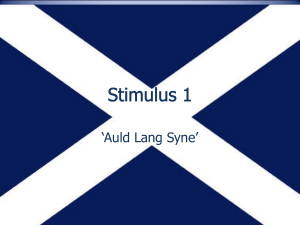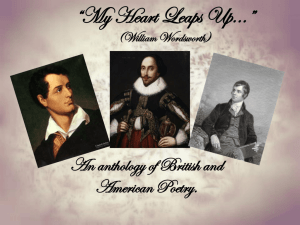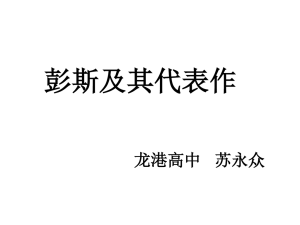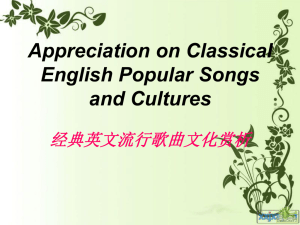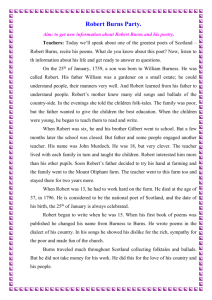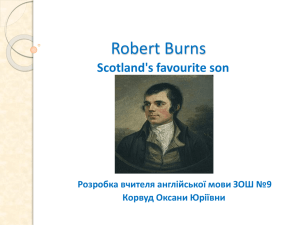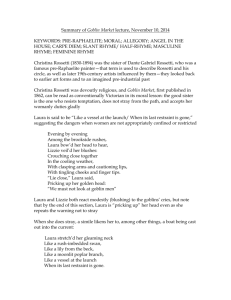File - Class with Ms. Krumholz
advertisement
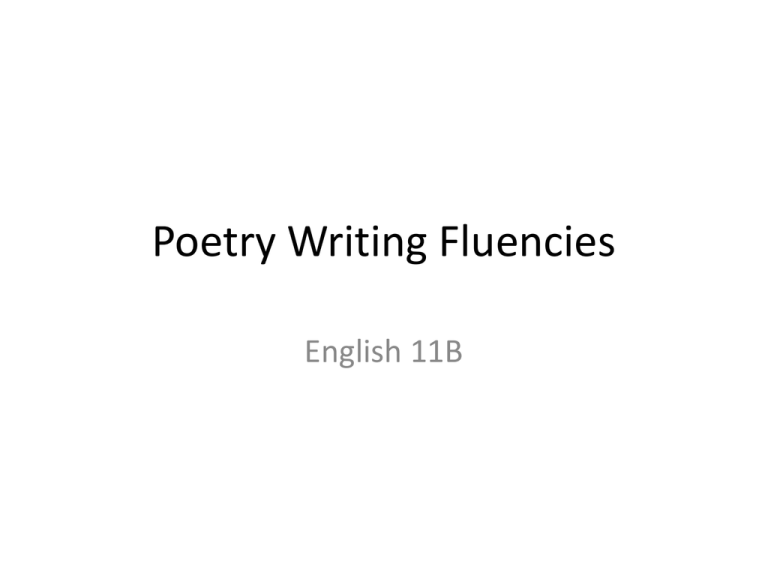
Poetry Writing Fluencies English 11B Poetry 1 – John Donne’s “Song” GO and catch a falling star, Get with child a mandrake root, Tell me where all past years are, Or who cleft the devil's foot, Teach me to hear mermaids singing, Or to keep off envy's stinging, And find What wind Serves to advance an honest mind. If thou be'st born to strange sights, Things invisible to see, Ride ten thousand days and nights, Till age snow white hairs on thee, Thou, when thou return'st, wilt tell me, All strange wonders that befell thee, And swear, No where Lives a woman true and fair. If thou find'st one, let me know, Such a pilgrimage were sweet; Yet do not, I would not go, Though at next door we might meet, Though she were true, when you met her, And last, till you write your letter, Yet she Will be False, ere I come, to two, or three. Themes • Relationships • Impossible things Other topics • Do you agree with the speaker? Is it impossible for someone to be both beautiful and faithful? Poetry 2 – John Donne “Holy Sonnet 10” Death be not proud, though some have called thee Mighty and dreadful, for, thou art not so, For, those, whom thou think'st, thou dost overthrow, Die not, poor death, nor yet canst thou kill me. From rest and sleep, which but thy pictures be, Much pleasure, then from thee, much more must flow, And soonest our best men with thee do go, Rest of their bones, and souls delivery. Thou art slave to Fate, Chance, kings, and desperate men, And dost with poison, war, and sickness dwell, And poppy, or charms can make us sleep as well, And better then thy stroke; why swell'st thou then? One short sleep past, we wake eternally, And death shall be no more; death, thou shalt die. Themes • Death as a mortal being • Victory over death • Fear of dying Other topics • What happens when we die? Poetry 3 – Robert Burns “Auld Lang Syne” Should auld acquaintance be forgot, and never brought to mind? Should auld acquaintance be forgot, and auld lang syne? Should old acquaintance be forgot, and never brought to mind? Should old acquaintance be forgot, and old lang syne CHORUS: For auld lang syne, my jo, for auld lang syne, we’ll tak a cup o’ kindness yet, for auld lang syne. CHORUS: For auld lang syne, my dear, for auld lang syne, we'll take a cup of kindness yet, for auld lang syne. And surely ye’ll be your pint-stowp! and surely I’ll be mine! And we’ll tak a cup o’ kindness yet, for auld lang syne. And surely you’ll buy your pint cup! and surely I’ll buy mine! And we'll take a cup o’ kindness yet, for auld lang syne. Themes • Remembering: – times gone by (the past). – people who have left us (passed away). Other topics • Why is this song so popular around the new year? • Is it right that old times should be remembered, or should we move on from the past? Poetry 4 – William Blake “The Tyger” (1794) Tyger! Tyger! burning bright In the forests of the night, What immortal hand or eye Could frame thy fearful symmetry? What the hammer? what the chain? In what furnace was thy brain? What the anvil? what dread grasp Dare its deadly terrors clasp? In what distant deeps or skies Burnt the fire of thine eyes? On what wings dare he aspire? What the hand dare sieze the fire? When the stars threw down their spears, And watered heaven with their tears, Did he smile his work to see? Did he who made the Lamb make thee? And what shoulder, & what art. Could twist the sinews of thy heart? And when thy heart began to beat, What dread hand? & what dread feet? Tyger! Tyger! burning bright In the forests of the night, What immortal hand or eye Dare frame thy fearful symmetry? Themes • Creation: Who created the tiger - a kind God or an evil devil? • Duality: can something be both beautiful and evil/horrible (cars, technology, etc.)? Other topics Poetry 5 – Percy Bysshe Shelley “Ozymandias” I met a traveller from an antique land Who said: "Two vast and trunkless legs of stone Stand in the desert. Near them on the sand, Half sunk, a shattered visage lies, whose frown And wrinkled lip and sneer of cold command Tell that its sculptor well those passions read Which yet survive, stamped on these lifeless things, The hand that mocked them and the heart that fed. And on the pedestal these words appear: `My name is Ozymandias, King of Kings: Look on my works, ye mighty, and despair!' Nothing beside remains. Round the decay Of that colossal wreck, boundless and bare, The lone and level sands stretch far away". Themes • Pride and the fall (the rise and fall of civilizations) • Man vs. Nature • Time Other topics Poetry 6 – Samuel Taylor Coleridge “Kubla Khan” Or a Vision in a Dream. A Fragment In Xanadu did Kubla Khan A stately pleasure dome decree: Where Alph, the sacred river, ran Through caverns measureless to man Down to a sunless sea. So twice five miles of fertile ground With walls and towers were girdled round: And there were gardens bright with sinuous rills, Where blossomed many an incensebearing tree; And here were forests ancient as the hills, Enfolding sunny spots of greenery. But oh! that deep romantic chasm which slanted Down the green hill athwart a cedarn cover! A savage place! as holy and enchanted As e'er beneath a waning moon was haunted By woman wailing for her demon lover! And from this chasm, with ceaseless turmoil seething, As if this earth in fast thick pants were breathing, A mighty fountain momently was forced: Amid whose swift halfintermitted burst Huge fragments vaulted like rebounding hail, Or chaffy grain beneath the thresher's flail: And 'mid these dancing rocks at once and ever It flung up momently the sacred river. Five miles meandering with a mazy motion Through wood and dale the sacred river ran, Then reached the caverns measureless to man, And sank in tumult to a lifeless ocean: And 'mid this tumult Kubla heard from far Ancestral voices prophesying war! The shadow of the dome of pleasure Floated midway on the waves; Where was heard the mingled measure From the fountain and the caves. It was a miracle of rare device, A sunny pleasure-dome with caves of ice! A damsel with a dulcimer In a vision once I saw; It was an Abyssinian maid, And on her dulcimer she played, Singing of Mount Abora. Could I revive within me Her symphony and song, To such a deep delight 'twould win me, That with music loud and long, I would build that dome in air, That sunny dome! those caves of ice! And all who heard should see them there, And all should cry, Beware! Beware! His flashing eyes, his floating hair! Weave a circle round him thrice, And close your eyes with holy dread, For he on honey-dew hath fed, And drunk the milk of Paradise. Themes • Imagination – With in dreams • Visions – Desire to achieve – Danger of doing so Other topics • Chant-like or musical style -- Rhyme scheme ABAABCCDEDE • Motifs – Natural world Poetry 7 – Christina Rossetti “Goblin Market” (1862) • Laura and Lizzie live by themselves, and are accustomed to draw water every evening from a stream. • As the poem begins, the sisters hear the calls from the goblin merchants, who sell fruits in fantastic abundance, variety and taste/smell. • Lizzie warns: “We must not look at goblin men, We must not buy their fruits: Who knows upon what soil they fed Their hungry thirsty roots?” • On this evening, Laura lingers at the stream after her sister has left for home, intrigued by the goblins' strange manner and appearance. Wanting fruit but having no money, the impulsive Laura offers a lock of her hair and "a tear more rare than pearl." • Laura gorges on the delicious fruit, then once she is finished, returns home in an ecstatic trance. • Lizzie reminds Laura about the cautionary tale of Jeanie, another girl who had eaten the goblin’s fruits and died after a long and horrible decline. Laura dismisses her sister's worries, and says she shall return to the goblins the next night and return with more fruits for herself and Lizzie. • The next day, as Laura and Lizzie go about their work in the house, Laura dreamily longs for the coming evening's meeting with the goblins. But at the stream that evening, as she strains to hear the usual goblin chants and cries, Laura discovers to her horror that, although Lizzie still hears the goblins' voices, she no longer can. • Unable to buy more of the forbidden fruit, and sickening for the lack of it, Laura falls into a slow physical deterioration and depression. As winter approaches, she withers away, ageing at an unnatural rate. • Weeks and months pass, and finally Lizzie realizes that Laura is on the verge of death. Tender Lizzie could not bear To watch her sister’s cankerous care Yet not to share. She night and morning Caught the goblins’ cry: “Come buy our orchard fruits, Come buy, come buy;”— Beside the brook, along the glen, She heard the tramp of goblin men, The yoke and stir Poor Laura could not hear; Long’d to buy fruit to comfort her, But fear’d to pay too dear. She thought of Jeanie in her grave, Who should have been a bride; But who for joys brides hope to have Fell sick and died In her gay prime, In earliest winter time With the first glazing rime, With the first snow-fall of crisp winter time. Till Laura dwindling Seem’d knocking at Death’s door: Then Lizzie weigh’d no more Better and worse; But put a silver penny in her purse, Kiss’d Laura, cross’d the heath with clumps of furze At twilight, halted by the brook: And for the first time in her life Began to listen and look. Themes • Biblical allusions – Forbidden fruit – Temptations • “Fallen women” • Drug addiction • Sisters Other topics Poetry 8 – Alfred Lord Tennyson "The Lady of Shalott“ (1833-1842) • Part 1 – The Lady of Shalott, Elaine of Astolat, lives in a castle on an island near Camelot. • Part 2 – In her tower she weaves and watches shadows of newlyweds in her mirror. She longs to be wedded. • Part 3 – She sees Lancelot, a knight of Camelot, singing on his way to Camelot. Sick of shadows, she leaves her room because she wants to risk seeing him. Poetry 9 – Robert Browning “My Last Duchess” () Themes Other topics Poetry 10 – Matthew Arnold “Dover Beach” () Themes Other topics Poetry 11 – Dylan Thomas “Do Not Go Gentle into That Good Night” () Themes Other topics

